江苏省永丰初级中学牛津译林版英语九年级上Unit2 Colours Grammar课件 (29张PPT)
文档属性
| 名称 | 江苏省永丰初级中学牛津译林版英语九年级上Unit2 Colours Grammar课件 (29张PPT) | 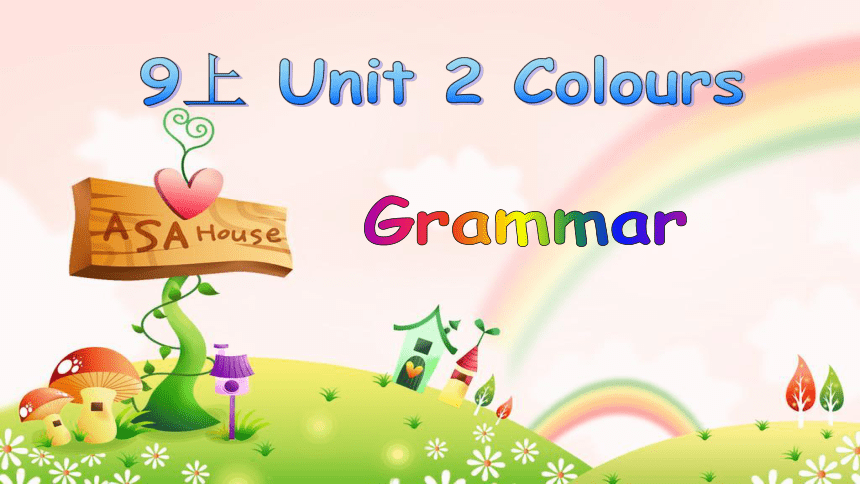 | |
| 格式 | zip | ||
| 文件大小 | 1.8MB | ||
| 资源类型 | 教案 | ||
| 版本资源 | 牛津译林版 | ||
| 科目 | 英语 | ||
| 更新时间 | 2020-09-13 21:14:01 | ||
图片预览

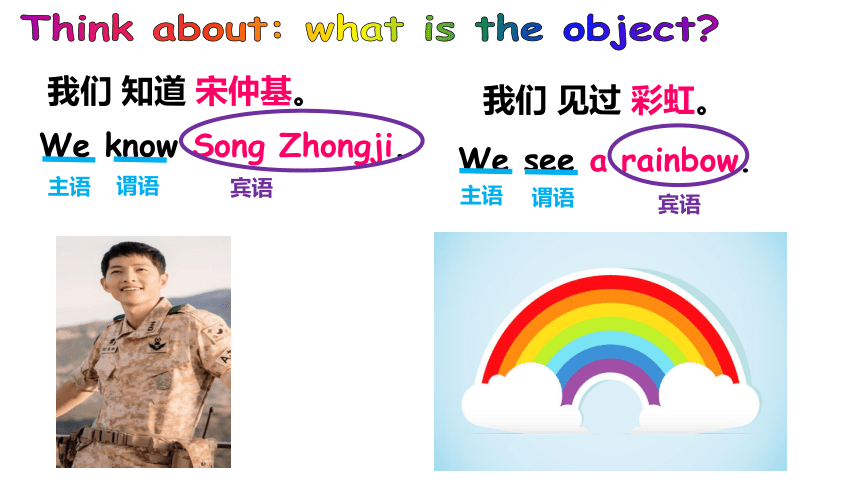
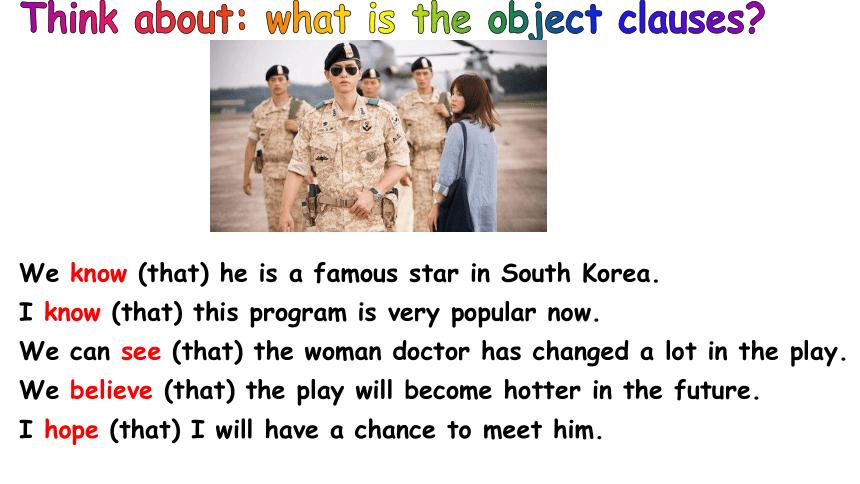
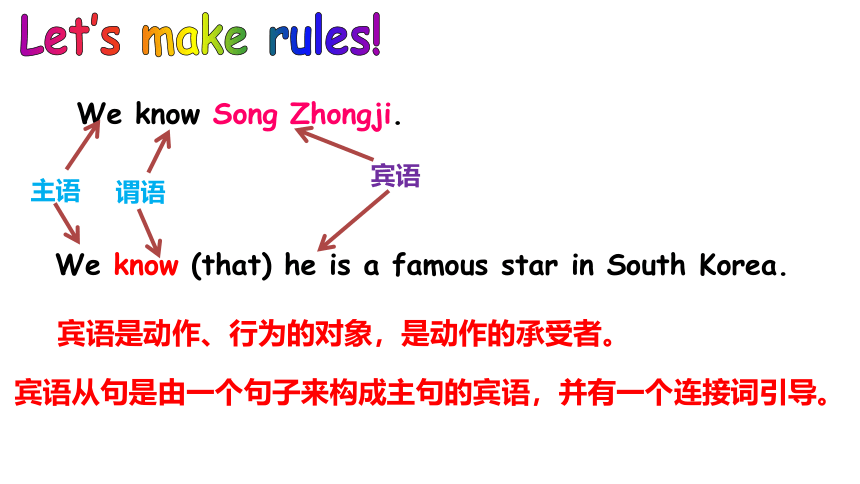
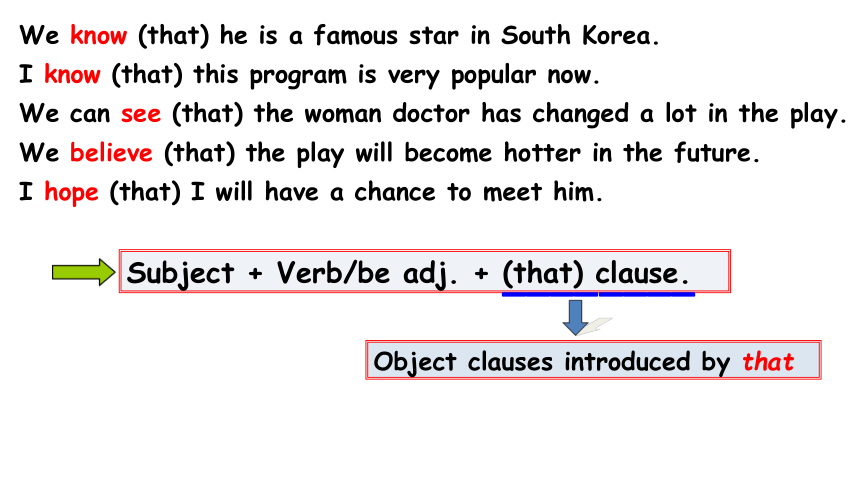
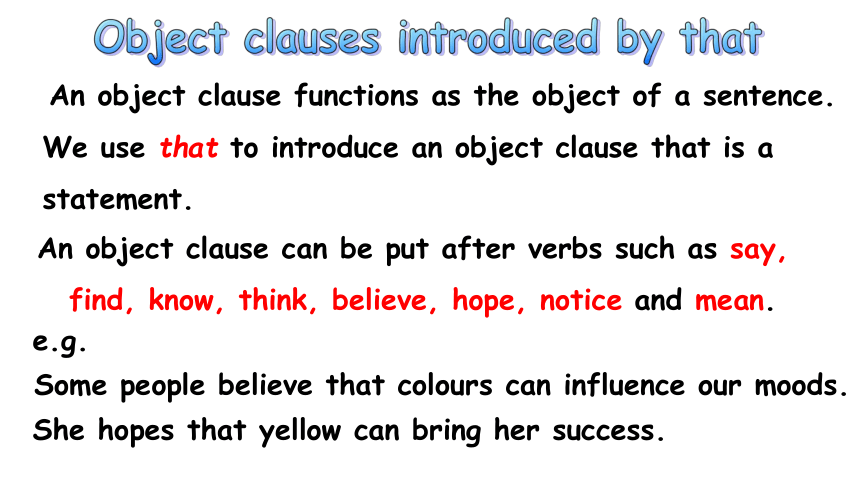
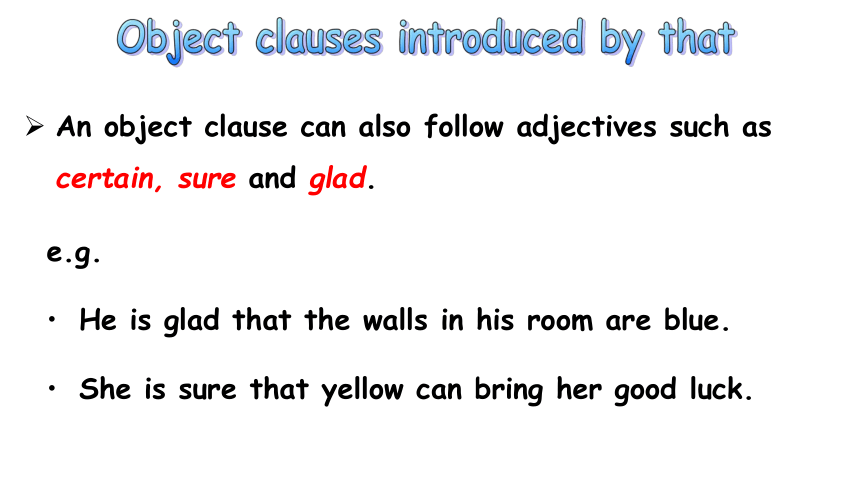
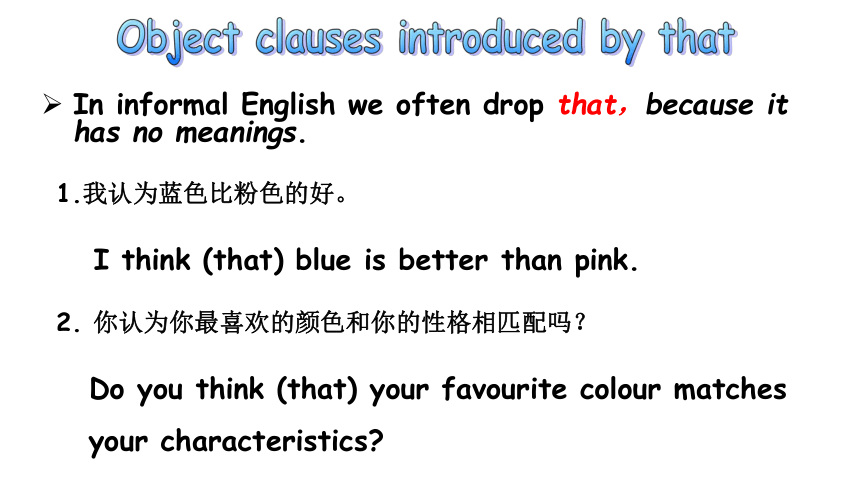
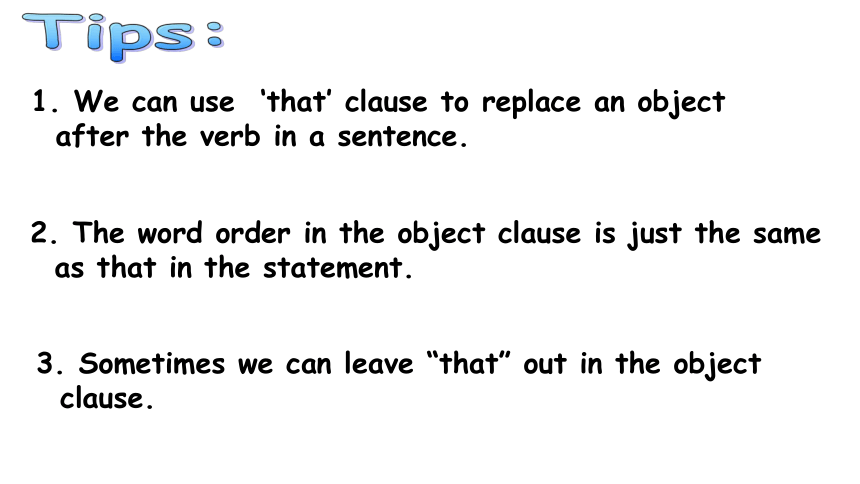
文档简介
(共29张PPT)
Grammar
9上
Unit
2
Colours
我们
知道
宋仲基。
We
know
Song
Zhongji.
我们
见过
彩虹。
We
see
a
rainbow.
Think
about:
what
is
the
object?
主语
主语
谓语
谓语
宾语
宾语
Think
about:
what
is
the
object
clauses?
We
know
(that)
he
is
a
famous
star
in
South
Korea.
I
know
(that)
this
program
is
very
popular
now.
We
can
see
(that)
the
woman
doctor
has
changed
a
lot
in
the
play.
We
believe
(that)
the
play
will
become
hotter
in
the
future.
I
hope
(that)
I
will
have
a
chance
to
meet
him.
Let’s
make
rules!
We
know
Song
Zhongji.
We
know
(that)
he
is
a
famous
star
in
South
Korea.
主语
谓语
宾语
宾语是动作、行为的对象,是动作的承受者。
宾语从句是由一个句子来构成主句的宾语,并有一个连接词引导。
We
know
(that)
he
is
a
famous
star
in
South
Korea.
I
know
(that)
this
program
is
very
popular
now.
We
can
see
(that)
the
woman
doctor
has
changed
a
lot
in
the
play.
We
believe
(that)
the
play
will
become
hotter
in
the
future.
I
hope
(that)
I
will
have
a
chance
to
meet
him.
Subject
+
Verb/be
adj.
+
(that)
clause.
________
Object
clauses
introduced
by
that
Object
clauses
introduced
by
that
An
object
clause
functions
as
the
object
of
a
sentence.
We
use
that
to
introduce
an
object
clause
that
is
a
statement.
An
object
clause
can
be
put
after
verbs
such
as
say,
find,
know,
think,
believe,
hope,
notice
and
mean.
e.g.
Some
people
believe
that
colours
can
influence
our
moods.
She
hopes
that
yellow
can
bring
her
success.
Object
clauses
introduced
by
that
An
object
clause
can
also
follow
adjectives
such
as
certain,
sure
and
glad.
e.g.
He
is
glad
that
the
walls
in
his
room
are
blue.
She
is
sure
that
yellow
can
bring
her
good
luck.
Object
clauses
introduced
by
that
In
informal
English
we
often
drop
that,because
it
has
no
meanings.
1.我认为蓝色比粉色的好。
I
think
(that)
blue
is
better
than
pink.
2.
你认为你最喜欢的颜色和你的性格相匹配吗?
Do
you
think
(that)
your
favourite
colour
matches
your
characteristics?
1.
We
can
use
‘that’
clause
to
replace
an
object
after
the
verb
in
a
sentence.
2.
The
word
order
in
the
object
clause
is
just
the
same
as
that
in
the
statement.
3.
Sometimes
we
can
leave
“that”
out
in
the
object
clause.
Tips:
Sandy
is
chatting
online
with
Millie
about
room
colours.
Try
to
add
that
to
each
object
clause.
Practice
Millie:
Did
you
know
there
is
a
relationship
between
colours
and
moods?
Sandy:
Certainly.
I
think
colours
influence
our
everyday
lives
in
many
ways.
Millie:
How
should
we
choose
the
colours
for
the
rooms
of
a
house?
Sandy:
Most
people
think
light
colours
are
better
than
dark
ones.
Millie:
Yes.
I
notice
light
colours
make
rooms
seem
larger.
Sandy:
Sure.
I
also
know
blue
can
make
us
feel
relaxed
Millie:
Yes.
My
mum
says
blue
is
suitable
for
bedrooms.
I
also
find
some
people
prefer
orange
for
their
dining
rooms.
Sandy:
True,
but
it
depends
on
personal
taste.
Anyway,
we
should
choose
the
colour
which
makes
us
fell
comfortable.
∧
(that)
∧
(that)
∧
(that)
∧
(that)
∧
(that)
∧
(that)
∧
(that)
Translation
1.她知道Timmy是一个好学生。
2.
他爸爸说他最喜欢的颜色是红色。
3.
我们意识到我们要努力工作。
4.
我想知道他是不是我们的新老师。
She
knows
(that)
Timmy
is
a
good
student.
His
father
said
(that)
his
favourite
colour
is
red.
We
realize
(that)
we
should
work
hard.
We
want
to
know
if
he
is
our
new
teacher.
Object
clauses
introduced
by
if/whether
An
object
clause
functions
as
the
object
of
a
sentence.
We
use
if/whether
to
introduce
an
object
clause
that
expresses
a
yes/no
question.
An
object
clause
can
be
put
after
verbs
such
as
ask,
see,
wonder,
think,
and
find
out.
The
word
order
in
the
clause
should
be
the
same
as
that
in
a
statement.
e.g.
You
may
wonder
if/whether
colours
influence
our
moods.
Sandy
asks
if/whether
orange
can
cheer
her
up.
What
are
the
differences
between
if/whether?
I
am
interested
in
whether
he’ll
go
to
have
a
picnic.
Whether
this
is
true
or
not,
I
am
not
sure.
We
didn’t
know
whether
or
not
she
has
come.
Please
let
me
know
________
you
like
it.(if/whether)
作介词的宾语时,用whether
不用if
从句可以移到主句之前的,用whether
引导而不用if
后面紧接or
not,只用whether.
用if引起歧义时,只用whether.
whether
The
Class1
Grand9
students
are
shopping.
Complete
the
sentences
by
using
if
or
whether
to
make
object
clauses.
Practice
Should
I
choose
the
red
dress?
Kitty
cannot
decide
______________________
___________________
if/whether
she
should
choose
the
red
dress.
Do
white
clothes
suit
me?
Sandy
does
not
know___________________
___________________
if/whether
white
clothes
suit
her.
Is
the
sports
bag
made
of
cotton?
Should
I
choose
the
red
dress?
Amy
is
asking
___________________________
_________________
if/whether
the
sports
bag
is
made
of
cotton.
Simon
is
not
sure
_________________________
_______________________
if/whether
the
green
T-shirt
matches
his
trousers.
Should
I
stay
at
home
instead
of
going
shopping
with
my
classmates?
Daniel
often
wonders
______________________
_______________________________________
if/whether
he
should
stay
at
home
instead
of
going
shopping
with
my
classmates.
Exercises:
I
hear
(that)
Jim
_____(be)a
worker
two
years
ago.
Jim
_____(be)an
English
teacher
now.
Jim
________(cook)dinner
tomorrow.
Jim
________(sing)a
popular
song
now.
Jim
_______(be)to
the
Great
Wall
twice.
Jim
__________(play)basketball
when
his
father
came
back.
Jim
_________(learn)1000
Chinese
words
by
the
end
of
last
semester.
was
is
will
cook
is
singing
has
been
was
playing
had
learned
Working
our
rules:
1.
当主句是一般现在时,宾语从句的时态不作限制,我们可以根据句子的需要使用任何一种时态。(需要性原则)
Exercises:
1)He
will
go
to
Hong
Kong.
2)He
is
sick.
3)He
is
reading
a
book.
4)He
has
finished
his
work.
He
said
(that)
1)He
__________to
Hong
Kong.
2)He
__________sick.
3)He
___________a
book.
4)He
___________his
work.
would
go
was
was
reading
had
finished
Working
our
rules:
2.
当主句是一般过去时的时候,宾语从句必须用相对应的过去的某一种时态,从而达到主句和从句的相互一致。(呼应性原则)
He
told
me
(that)
Summer
is
after
Spring.
I
was
told
(that)
the
sun
is
much
bigger
than
the
moon.
My
parents
told
me
(that)
no
new
is
good
news.
Working
our
rules:
3.
当宾语从句说明的是客观存在的事实或者是客观存在的真理时,就不用受到主句时态的限制,仍是用一般现在时。(特殊性原则)
Competition
Make
a
conclusion:
宾
语
从
句
三
要
素
引导词
时态
语序
that
if/whether
(陈述句)
(一般疑问句)
主句为一般现在时
主句为一般过去时
从句
从句可为任何时态
一般过去时
过去将来时
过去进行时
过去完成时
客观真理、自然现象
公式定理、名言警句仍然用一般现在时
宾语从句的语序都为陈述句语序
Homework
Remember
how
to
use
object
clauses
introduced
by
‘that/
if/whether’.
Finish
the
relevant
exercises.
Thank
you!
Dear
Tommy,
Have
you
ever
noticed
the
colours
around
you?
Colours
are
really
interesting.
A
report
says
___________blue
can
help
us
feel
relaxed
because
it
represents
peace.
You
may
wonder
___________it
represents
anything
else.
Yes.
Blue
also
means
sadness.
I
do
not
know
___________you
like
green.
Some
people
think
___________green
can
give
us
energy,
but
it
also
represents
envy.
Did
you
know
___________red
represents
good
luck
in
China?
It
is
often
used
for
celebrations!
Please
tell
me
your
favourite
colour
and
___________
you
know
anything
else
about
colours.
Write
back
soon.
Best
whishes,
Daniel
Help
Daniel
complete
the
email
by
using
that/if/whether.
that
if/whether
that
that
if/whether
if/whether
Help
Daniel
complete
his
questions.
1
Dad
knows
a
lot
about
colours.
2
Is
red
just
the
colour
of
heat
and
power?
3
Was
yellow
once
the
colour
of
the
rulers
in
ancient
China?
4
Did
the
rulers
in
ancient
Europe
like
to
wear
purple?
5
Do
all
the
doctors
in
the
world
wear
white
uniforms?
I
believe______________________________________________
I
wonder
_____________________________________________
I
want
to
know
_______________________________________
______________________________________
I
do
not
know
________________________________________________
__________________________________________
I
am
not
certain
______________________________________
that
dad
knows
a
lot
about
colours.
if/whether
red
is
just
the
colour
of
heat
and
power.
if/whether
yellow
was
once
the
colour
of
the
rulers
in
ancient
China.
if/whether
the
rulers
in
ancient
Europe
liked
to
wear
purple.
if/whether
all
the
doctors
in
the
world
wear
white
uniforms.
Help
sandy
choose
the
best
answer.
I
haven’t
decide
______
I
will
go
out
or
stay
at
home.
A.
if
B.
when
C.
why
D.
whether
I
want
to
know
_________
you
love
English.
A.
that
B.
what
C.
if
D.
who
3.
I
wonder
______
our
teacher
will
come
to
my
birthday
party.
A.
whether
B.
why
C.
where
D.
that
4.
I’d
like
to
know__________
or
not.
A.
whether
will
he
comes
B.
whether
he
will
comes
C.
if
will
he
comes
D.
if
he
will
comes
Help
Millie
fill
in
the
blanks.
—John,
would
you
like
to
go
camping
with
me
this
afternoon?
—I’d
to,
but
I’m
not
sure
___________
my
parents
will
agree.
2.
I’m
not
good
at
English,
and
I
wonder
____________or
not
I
can
pass
the
English
test.
3.
I
believe
__________
I
have
made
a
wise
decision,
so
I
won’t
change
my
mind.
4.
—
I
hope
__________
all
my
dreams
can
come
true.
—
If
you
try
your
best,
they
will
surely
be
realized.
5.
—May
I
ask
___________you
will
come
to
our
party
this
weekend?
—Yes,
I’ll
be
glad
to.
Thanks
for
your
invitation.
if/whether
whether
that
that
if/whether
Your
group
can
get
5
points!
Grammar
9上
Unit
2
Colours
我们
知道
宋仲基。
We
know
Song
Zhongji.
我们
见过
彩虹。
We
see
a
rainbow.
Think
about:
what
is
the
object?
主语
主语
谓语
谓语
宾语
宾语
Think
about:
what
is
the
object
clauses?
We
know
(that)
he
is
a
famous
star
in
South
Korea.
I
know
(that)
this
program
is
very
popular
now.
We
can
see
(that)
the
woman
doctor
has
changed
a
lot
in
the
play.
We
believe
(that)
the
play
will
become
hotter
in
the
future.
I
hope
(that)
I
will
have
a
chance
to
meet
him.
Let’s
make
rules!
We
know
Song
Zhongji.
We
know
(that)
he
is
a
famous
star
in
South
Korea.
主语
谓语
宾语
宾语是动作、行为的对象,是动作的承受者。
宾语从句是由一个句子来构成主句的宾语,并有一个连接词引导。
We
know
(that)
he
is
a
famous
star
in
South
Korea.
I
know
(that)
this
program
is
very
popular
now.
We
can
see
(that)
the
woman
doctor
has
changed
a
lot
in
the
play.
We
believe
(that)
the
play
will
become
hotter
in
the
future.
I
hope
(that)
I
will
have
a
chance
to
meet
him.
Subject
+
Verb/be
adj.
+
(that)
clause.
________
Object
clauses
introduced
by
that
Object
clauses
introduced
by
that
An
object
clause
functions
as
the
object
of
a
sentence.
We
use
that
to
introduce
an
object
clause
that
is
a
statement.
An
object
clause
can
be
put
after
verbs
such
as
say,
find,
know,
think,
believe,
hope,
notice
and
mean.
e.g.
Some
people
believe
that
colours
can
influence
our
moods.
She
hopes
that
yellow
can
bring
her
success.
Object
clauses
introduced
by
that
An
object
clause
can
also
follow
adjectives
such
as
certain,
sure
and
glad.
e.g.
He
is
glad
that
the
walls
in
his
room
are
blue.
She
is
sure
that
yellow
can
bring
her
good
luck.
Object
clauses
introduced
by
that
In
informal
English
we
often
drop
that,because
it
has
no
meanings.
1.我认为蓝色比粉色的好。
I
think
(that)
blue
is
better
than
pink.
2.
你认为你最喜欢的颜色和你的性格相匹配吗?
Do
you
think
(that)
your
favourite
colour
matches
your
characteristics?
1.
We
can
use
‘that’
clause
to
replace
an
object
after
the
verb
in
a
sentence.
2.
The
word
order
in
the
object
clause
is
just
the
same
as
that
in
the
statement.
3.
Sometimes
we
can
leave
“that”
out
in
the
object
clause.
Tips:
Sandy
is
chatting
online
with
Millie
about
room
colours.
Try
to
add
that
to
each
object
clause.
Practice
Millie:
Did
you
know
there
is
a
relationship
between
colours
and
moods?
Sandy:
Certainly.
I
think
colours
influence
our
everyday
lives
in
many
ways.
Millie:
How
should
we
choose
the
colours
for
the
rooms
of
a
house?
Sandy:
Most
people
think
light
colours
are
better
than
dark
ones.
Millie:
Yes.
I
notice
light
colours
make
rooms
seem
larger.
Sandy:
Sure.
I
also
know
blue
can
make
us
feel
relaxed
Millie:
Yes.
My
mum
says
blue
is
suitable
for
bedrooms.
I
also
find
some
people
prefer
orange
for
their
dining
rooms.
Sandy:
True,
but
it
depends
on
personal
taste.
Anyway,
we
should
choose
the
colour
which
makes
us
fell
comfortable.
∧
(that)
∧
(that)
∧
(that)
∧
(that)
∧
(that)
∧
(that)
∧
(that)
Translation
1.她知道Timmy是一个好学生。
2.
他爸爸说他最喜欢的颜色是红色。
3.
我们意识到我们要努力工作。
4.
我想知道他是不是我们的新老师。
She
knows
(that)
Timmy
is
a
good
student.
His
father
said
(that)
his
favourite
colour
is
red.
We
realize
(that)
we
should
work
hard.
We
want
to
know
if
he
is
our
new
teacher.
Object
clauses
introduced
by
if/whether
An
object
clause
functions
as
the
object
of
a
sentence.
We
use
if/whether
to
introduce
an
object
clause
that
expresses
a
yes/no
question.
An
object
clause
can
be
put
after
verbs
such
as
ask,
see,
wonder,
think,
and
find
out.
The
word
order
in
the
clause
should
be
the
same
as
that
in
a
statement.
e.g.
You
may
wonder
if/whether
colours
influence
our
moods.
Sandy
asks
if/whether
orange
can
cheer
her
up.
What
are
the
differences
between
if/whether?
I
am
interested
in
whether
he’ll
go
to
have
a
picnic.
Whether
this
is
true
or
not,
I
am
not
sure.
We
didn’t
know
whether
or
not
she
has
come.
Please
let
me
know
________
you
like
it.(if/whether)
作介词的宾语时,用whether
不用if
从句可以移到主句之前的,用whether
引导而不用if
后面紧接or
not,只用whether.
用if引起歧义时,只用whether.
whether
The
Class1
Grand9
students
are
shopping.
Complete
the
sentences
by
using
if
or
whether
to
make
object
clauses.
Practice
Should
I
choose
the
red
dress?
Kitty
cannot
decide
______________________
___________________
if/whether
she
should
choose
the
red
dress.
Do
white
clothes
suit
me?
Sandy
does
not
know___________________
___________________
if/whether
white
clothes
suit
her.
Is
the
sports
bag
made
of
cotton?
Should
I
choose
the
red
dress?
Amy
is
asking
___________________________
_________________
if/whether
the
sports
bag
is
made
of
cotton.
Simon
is
not
sure
_________________________
_______________________
if/whether
the
green
T-shirt
matches
his
trousers.
Should
I
stay
at
home
instead
of
going
shopping
with
my
classmates?
Daniel
often
wonders
______________________
_______________________________________
if/whether
he
should
stay
at
home
instead
of
going
shopping
with
my
classmates.
Exercises:
I
hear
(that)
Jim
_____(be)a
worker
two
years
ago.
Jim
_____(be)an
English
teacher
now.
Jim
________(cook)dinner
tomorrow.
Jim
________(sing)a
popular
song
now.
Jim
_______(be)to
the
Great
Wall
twice.
Jim
__________(play)basketball
when
his
father
came
back.
Jim
_________(learn)1000
Chinese
words
by
the
end
of
last
semester.
was
is
will
cook
is
singing
has
been
was
playing
had
learned
Working
our
rules:
1.
当主句是一般现在时,宾语从句的时态不作限制,我们可以根据句子的需要使用任何一种时态。(需要性原则)
Exercises:
1)He
will
go
to
Hong
Kong.
2)He
is
sick.
3)He
is
reading
a
book.
4)He
has
finished
his
work.
He
said
(that)
1)He
__________to
Hong
Kong.
2)He
__________sick.
3)He
___________a
book.
4)He
___________his
work.
would
go
was
was
reading
had
finished
Working
our
rules:
2.
当主句是一般过去时的时候,宾语从句必须用相对应的过去的某一种时态,从而达到主句和从句的相互一致。(呼应性原则)
He
told
me
(that)
Summer
is
after
Spring.
I
was
told
(that)
the
sun
is
much
bigger
than
the
moon.
My
parents
told
me
(that)
no
new
is
good
news.
Working
our
rules:
3.
当宾语从句说明的是客观存在的事实或者是客观存在的真理时,就不用受到主句时态的限制,仍是用一般现在时。(特殊性原则)
Competition
Make
a
conclusion:
宾
语
从
句
三
要
素
引导词
时态
语序
that
if/whether
(陈述句)
(一般疑问句)
主句为一般现在时
主句为一般过去时
从句
从句可为任何时态
一般过去时
过去将来时
过去进行时
过去完成时
客观真理、自然现象
公式定理、名言警句仍然用一般现在时
宾语从句的语序都为陈述句语序
Homework
Remember
how
to
use
object
clauses
introduced
by
‘that/
if/whether’.
Finish
the
relevant
exercises.
Thank
you!
Dear
Tommy,
Have
you
ever
noticed
the
colours
around
you?
Colours
are
really
interesting.
A
report
says
___________blue
can
help
us
feel
relaxed
because
it
represents
peace.
You
may
wonder
___________it
represents
anything
else.
Yes.
Blue
also
means
sadness.
I
do
not
know
___________you
like
green.
Some
people
think
___________green
can
give
us
energy,
but
it
also
represents
envy.
Did
you
know
___________red
represents
good
luck
in
China?
It
is
often
used
for
celebrations!
Please
tell
me
your
favourite
colour
and
___________
you
know
anything
else
about
colours.
Write
back
soon.
Best
whishes,
Daniel
Help
Daniel
complete
the
by
using
that/if/whether.
that
if/whether
that
that
if/whether
if/whether
Help
Daniel
complete
his
questions.
1
Dad
knows
a
lot
about
colours.
2
Is
red
just
the
colour
of
heat
and
power?
3
Was
yellow
once
the
colour
of
the
rulers
in
ancient
China?
4
Did
the
rulers
in
ancient
Europe
like
to
wear
purple?
5
Do
all
the
doctors
in
the
world
wear
white
uniforms?
I
believe______________________________________________
I
wonder
_____________________________________________
I
want
to
know
_______________________________________
______________________________________
I
do
not
know
________________________________________________
__________________________________________
I
am
not
certain
______________________________________
that
dad
knows
a
lot
about
colours.
if/whether
red
is
just
the
colour
of
heat
and
power.
if/whether
yellow
was
once
the
colour
of
the
rulers
in
ancient
China.
if/whether
the
rulers
in
ancient
Europe
liked
to
wear
purple.
if/whether
all
the
doctors
in
the
world
wear
white
uniforms.
Help
sandy
choose
the
best
answer.
I
haven’t
decide
______
I
will
go
out
or
stay
at
home.
A.
if
B.
when
C.
why
D.
whether
I
want
to
know
_________
you
love
English.
A.
that
B.
what
C.
if
D.
who
3.
I
wonder
______
our
teacher
will
come
to
my
birthday
party.
A.
whether
B.
why
C.
where
D.
that
4.
I’d
like
to
know__________
or
not.
A.
whether
will
he
comes
B.
whether
he
will
comes
C.
if
will
he
comes
D.
if
he
will
comes
Help
Millie
fill
in
the
blanks.
—John,
would
you
like
to
go
camping
with
me
this
afternoon?
—I’d
to,
but
I’m
not
sure
___________
my
parents
will
agree.
2.
I’m
not
good
at
English,
and
I
wonder
____________or
not
I
can
pass
the
English
test.
3.
I
believe
__________
I
have
made
a
wise
decision,
so
I
won’t
change
my
mind.
4.
—
I
hope
__________
all
my
dreams
can
come
true.
—
If
you
try
your
best,
they
will
surely
be
realized.
5.
—May
I
ask
___________you
will
come
to
our
party
this
weekend?
—Yes,
I’ll
be
glad
to.
Thanks
for
your
invitation.
if/whether
whether
that
that
if/whether
Your
group
can
get
5
points!
